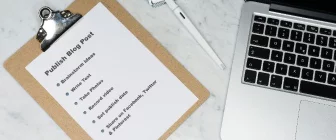
Just about any online content you put out there is going to need a headline.
If your online content isn’t generating a steady traffic flow, it could be lackluster headlines keeping people from taking a direct route to your site.
If the casual visitor can’t figure out what you’re trying to say, they’re certainly not going to take the time to figure it out.
With all the content found online, most people tend to skim until they find something of interest. This is why an effective headline is so important. Here are six tips for writing a descriptive, intriguing headline:
1. Keep It Short and Simple
An effective headline should never extend to two lines unless you’re using a headline and a subhead to further define your point. Keep it to around 8-10 words.
Convey one main point from the text that follows the headline. If the subsequent paragraph is discussing multiple topics, rework your paragraphs for the sake of organization.
2. Make Your Lists Even
When using a headline for each item on a list, the way this article is structured, a study published in The Guardian suggests even-numbered lists are more engaging.
While there’s no concrete proof that even lists will generate more leads, it does make for a visually appealing layout. Regardless of whether or not you subscribe to the even/odd thing, shorter lists tend to be easier for people to share with friends.
3. Ask an Intriguing Question
Most people have a natural curiosity, which is why headlines posing an intriguing question tend to be more effective. Just make sure you answer the question in the paragraph or video clip that follows the headline.
Question-based headlines tend to work best when you’re trying to convey how your product or service meets the needs of your intended audience by solving a common problem.
4. Use Negative Superlatives
Most consumers these days are pretty much immune to headlines that declare something is “the best” or some other generalized attribute.
According to Outbrain, negative superlatives tend to perform better than positive ones with questionable merit.
While there’s no reason given for this, it probably goes back to the curiosity factor of using words with a typical negative connotation actually used in a positive way.
Research by Startup Moon takes it a step further and reports better click through rates for headlines with “violent” words, as in “kill the cravings with our new diet” or “is an inefficient heating system bleeding you dry?”
5. Be Specific Whenever Possible
Be as specific as possible with your headline in terms of what you intend to present in your content, such as “five ways you can save money right now” or “how you can become a wiser investor in 30 minutes.”
These headlines perform better simply because you are letting the reader know either what they will gain from reading your content or how long it will take to achieve results from whatever it is you’re selling or offering.
For many consumers today, time is a precious commodity.
6. Personal Pronouns
Personal pronouns like “you” tend to make your content more relevant by talking directly to your intended audience.
For instance, the headline “how homeowners can enjoy cost-effective roof repairs” becomes more personal when written as “how you can benefit from cost-effective roof repairs.”
In marketing terms, you want to establish a connection with your audience. Dry, formal content speaking in general terms isn’t going to accomplish that goal.
